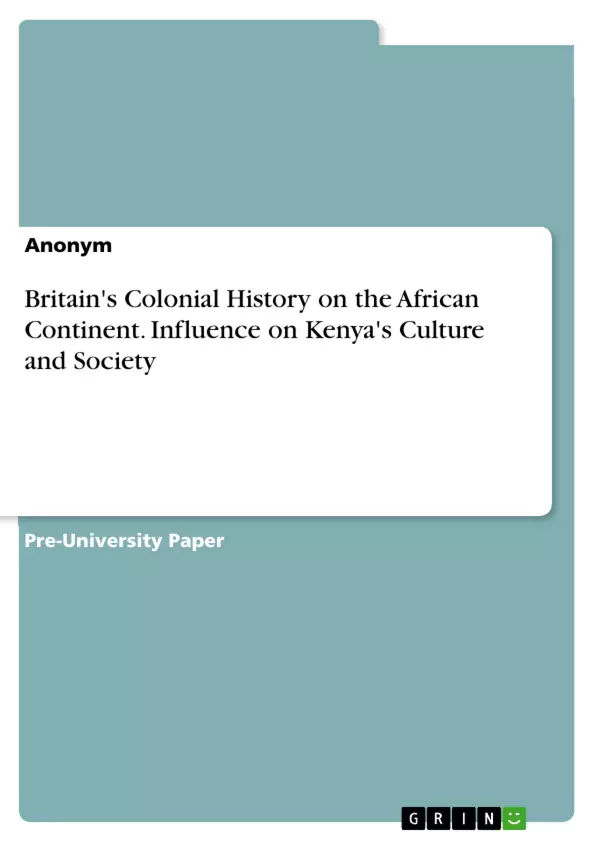This paper gives a summarized overview on how the British rule has affected Kenya and its society. The British Empire is known for being the biggest empire the world has ever seen. In 1922, 458 million people lived under the rule of the British crown, more than 20 % of the world's population. Originally, the British were not among the first European nations to discover our planet. Portugal and Spain acted as pioneers in the 15th and 16th century, discovering the world and building great empires that boosted their economies.
The British, along with other European countries such as France and the Netherlands, started to follow this example. During the 17th century, the British Empire established colonies in North- and Central America and Asia. Driven by commercial interests, the British also wanted to dominate the African continent, which was widely recognized as being extremely rich in resources. The first regions were mainly controlled by companies and businessmen who were widely independent of the crown.
The crown soon took over controlling the economic side of things. At first, those colonies were self-managing; the British designated African tribe leaders who controlled the procedures. But the exploitation of resources was not the only economic factor. European nations captured many indigenous people and sold them as slaves on the American continent. During the 19th century, the British started to expand inwards and discovered many opportunities for agricultural projects that could benefit the European market. Competition aroused as many nations fought for land and resources.
Table of Contents
- Britain's colonial history on the African continent
- Arabic and European settlement
- Oppression by the colonial government
- Resistance by the locals
- Individuals coping with the aftermath of imperialism
- Cultural heritage and society
Objectives and Key Themes
This text explores the impact of British colonialism on Kenya's culture and society. It examines the historical context, the oppression experienced by the indigenous population, the resistance movements that emerged, and the lasting consequences of imperialism on individuals and the nation as a whole.
- The historical context of British colonialism in Africa
- The consequences of British oppression on Kenyan individuals and society
- The resistance movements that challenged colonial rule
- The lasting impact of imperialism on Kenyan culture and identity
- The legacy of colonialism and its continued influence on modern Kenya
Chapter Summaries
- Britain's colonial history on the African continent: This chapter provides an overview of the British Empire's expansion into Africa, highlighting the economic and political motives behind the colonization of Kenya. It describes the early trade partnerships with Arabic and Persian businessmen, the Portuguese influence in Mombasa, and the subsequent establishment of the East African Protectorate by the British.
- Arabic and European settlement: This chapter focuses on the geographical factors that made Kenya attractive to European settlers and the pre-colonial presence of Arabic traders. It details the influence of Arabic culture on Kenyan society, the Portuguese occupation of Mombasa, and the eventual takeover by the British East African Company.
- Oppression by the colonial government: This chapter details the oppressive policies implemented by the British colonial government, including land seizures, forced labor, and restrictions on Kenyan farmers. It highlights the systematic discrimination against the indigenous population, the establishment of "The White Highlands," and the exploitation of Kenyan workers.
- Resistance by the locals: This chapter explores the various forms of resistance that emerged against British colonial rule, from early efforts like the East African Association to the more militant Mau Mau uprising. It examines the different perspectives on achieving independence, the role of Jomo Kenyatta and Field Marshal Mwariama, and the brutal suppression of the Mau Mau by British forces.
- Individuals coping with the aftermath of imperialism: This chapter explores the lasting impact of British colonialism on individual Kenyans, focusing on the trauma, loss, and injustices endured during the colonial period. It highlights the stories of victims seeking reparations and the lasting scars left by British oppression. Ngũgĩ wa Thiong'o's novel "Dreams in a time of war" is cited as an example of the impact of colonialism on individuals.
Keywords
The primary keywords and focus topics of the text include British colonialism, Kenya, oppression, resistance, Mau Mau, Jomo Kenyatta, Field Marshal Mwariama, cultural heritage, societal impact, and the lasting consequences of imperialism.
Frequently Asked Questions
How did British colonial rule start in Kenya?
British influence began with commercial interests, initially through the British East African Company. The crown eventually took control, establishing the East African Protectorate to dominate the region's rich resources and agricultural potential.
What was the Mau Mau uprising?
The Mau Mau uprising was a militant resistance movement against British colonial rule in Kenya. It was driven by grievances over land seizures, forced labor, and systematic discrimination against the indigenous population.
Who were the key figures in Kenya's struggle for independence?
Prominent figures included Jomo Kenyatta, who became Kenya's first president, and Field Marshal Mwariama, a key leader in the Mau Mau movement.
What were "The White Highlands"?
"The White Highlands" referred to fertile agricultural regions in Kenya that were reserved exclusively for European settlers, leading to the displacement and oppression of native Kenyan farmers.
How does colonialism still affect modern Kenya?
The legacy of colonialism is visible in Kenya's cultural heritage, societal structures, and the lasting trauma of individuals who sought reparations for injustices and land loss endured during British rule.
What role did Arabic culture play in Kenya's history?
Long before the British, Arabic and Persian traders established settlements and trade partnerships, significantly influencing the culture and society of coastal regions like Mombasa.
- Arbeit zitieren
- Anonym (Autor:in), 2020, Britain's Colonial History on the African Continent. Influence on Kenya's Culture and Society, München, GRIN Verlag, https://www.grin.com/document/1027029



